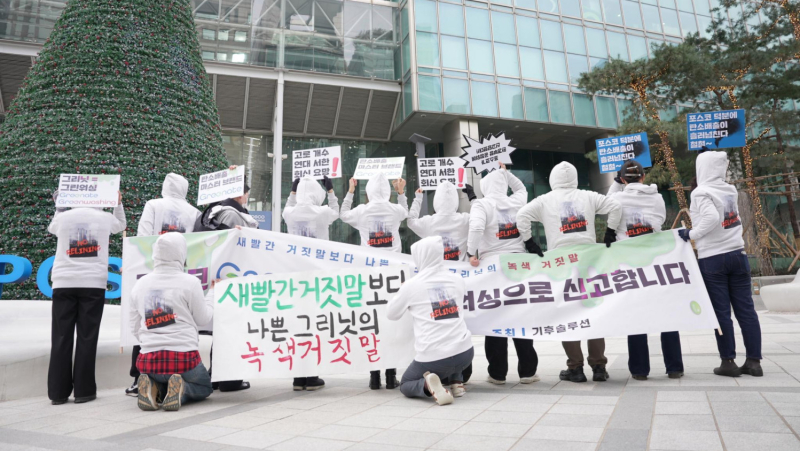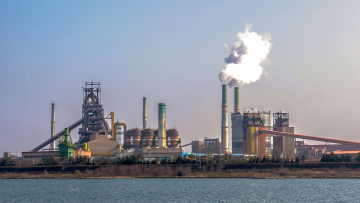POSCO is relining coal-based steel furnaces to prolong their lifetimes. This jeopardises its financiers' climate commitments.

On 6th October 2023, 24 civil society organisations delivered a letter to POSCO Holdings, South Korea’s largest steel maker, calling on it to stop prolonging the lifespan of its coal-fired blast furnaces and develop a plan to phase out remaining furnaces. It’s been over two months and POSCO hasn't responded. Today, South Korean environmental organisation Solutions for Our Climate (SFOC) filed a lawsuit against POSCO claiming it’s greenwashing its “carbon-neutral” steel brand Greenate. The lack of a response from POSCO topped with fresh litigation signifies its determination to continue with business-as-usual coal-based steelmaking, which should be a red flag for its financiers.
Continuing business-as-usual coal-based steel production would use 23% of the world's remaining carbon budget by 2050, and banks have begun to take note of the challenge at hand. According to BankTrack’s recently launched Iron and Steel bank target tracker, out of 20 of POSCO’s largest bank financiers, nine have specific steel decarbonisation targets, and three are planning to announce targets within three years (1). This means that in order for POSCO to be able to rely on its banking relationships and secure future finance, it must commit to a credible and transparent 1.5-degree aligned pathway, not only on paper, but also in its capital expenditure.
POSCO’s dirty relining plans
So far, it is estimated that POSCO has invested around USD 393 million to “reline” its Blast Furnace No. 4 in Pohang and Blast Furnace No. 2 in Gwangyang, Korea. Relining involves performing heavy maintenance on a furnace to prolong its lifetime, which locks in the use of coal in steelmaking for another 17+ years. According to a recent issue brief by SFOC, POSCO announced its relining plans for Pohang Blast Furnace No. 4 in its 2022 Half-Year financial report. The relining began in February 2023, and is scheduled to finish in October 2024. As of 30th June 2023, 4.24% of the budget for the reline has been spent. Additionally, in its 2019 Business Report, POSCO announced its decision to reline Gwangyang Blast Furnace No. 2, however as of November 2023, the company has not announced the start and end dates.
If both furnaces are relined as planned, they will emit at least an additional 199 Megatonnes of CO2 in the next 17 years, equivalent to the entirety of the United Arab Emirates’ annual CO2 emissions in 2021. Phasing out blast furnaces and removing coal from steelmaking also has the added benefit of reducing other industrial pollutants responsible for adverse health impacts. A report by SFOC and the Finland based Centre for Research on Energy and Clean Air (CREA) estimated that in 2021, South Korean blast furnaces were responsible for 506 premature deaths, 150 new cases of asthma, and 60 preterm births due to pollution exposure from steelmaking. POSCO’s Gwangyang and Pohang blast furnaces were revealed to be the most harmful. It also found that between 2022 and 2050 phasing coal out of steel production in South Korea could avoid over 9,300 cumulative premature deaths.
Given that neither relining has been completed, there is still time for POSCO to change its plans, or significantly scale them down so that they only address immediate and glaring health and safety risks, while committing to retire its blast furnaces before 2030.
The risk of stranded assets
POSCO’s relining campaign has a severe risk of stranded assets, as it not only jeopardises its financiers climate commitments, but also South Korea’s as a whole. South Korea has pledged to be carbon neutral by 2050, and under its Nationally Determined Contribution (NDC) to the Paris Accords, the country has set an unconditional NDC target of reducing greenhouse gas emissions to 40% below 2018 levels by 2030. As POSCO is South Korea’s largest emitter, there is a high probability that the policy tools South Korea employs to achieve its climate targets will make POSCO’s blast furnaces unprofitable or inoperable in a number of situations. For example, if the cost of carbon is realised through carbon pricing (i.e. taxes) or emission standards, a conventional steel plant may be unable to price competitively with low carbon steel making plants.
POSCO is also a major supplier to the automotive industry, which is increasingly deepening responsible sourcing practices and demanding low-carbon steel to address embodied emissions. A transition away from coal-based steel production and enhanced transparency in emissions reductions for each of its product lines is essential for making sure POSCO’s steel products do not pose greenwashing risks to their customers; an issue that emerged in the recent legal action against POSCO’s Greenate master brand. Without a commitment to phasing out coal in steel making, it is possible that POSCO will lose key customers.
Supporting POSCO’s transition to fossil-free steelmaking is crucial to meeting the steel industry’s, South Korea’s, and bank’s climate goals, as well as mitigating the harm done to communities living near its steel mills. Rather than reline its blast furnaces, this is an opportune time for POSCO to invest in fossil-free steelmaking technologies. For banks, it's an opportunity to translate their climate commitments into action by making their finance for POSCO conditional on the company stopping relining projects and phasing out coal-based steel.
Notes:
1. POSCO's financiers with set steel decarbonisation targets: HSBC, Citigroup, BNP Paribas, KB Financial Group, Standard Chartered, JPMorgan Chase, Mitsubishi UFJ Financial, ANZ, ING Group, Crédit Agricole
Banks with upcoming steel decarbonisation targets: SMBC Group, Goldman Sachs
To see the details of each bank's climate target, you can view BankTrack’s Iron & Steel Bank target tracker.

